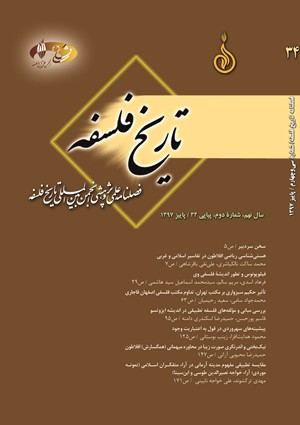فيلوپونوس و تطور انديشه فلسفي وي
محورهای موضوعی : اندیشههای حکمی و فلسفی ایران باستانفرهاد اسدی 1 , مریم سالم 2 , سید محمد اسماعیل سید هاشمی 3
1 - الهیات و ادیان - فلسفه اسلامی
2 - دانشگاه شهید بهشتی
3 - دانشگاه شهید بهشتی
کلید واژه: فيلوپونوس نوافلاطوني اسکندراني قدم جهان رويکرد نقّادانه الهيات مسيحي ,
چکیده مقاله :
فيلوپونوس، فيلسوف نوافلاطوني ـ اسکندراني دورة متأخر، در اکثر علوم عصر خود به حدي متبحر شده بود که برخي به او لقب علاّمه دادند. ولي اين تنها خصوصيت بارز اين متفکر مدرسة اسکندريه نيست. انديشة فيلوپونوس در طول عمر آکادميک خود، دچار نوسانات شگرفي گرديد که برخي شجاعت او را در نقد و ردّ آراء پيشينيان در حدّ يک قهرمان ستودهاند و وي را راهگشاي تفکر نقّادانه دانستهاند و برخي هم وي را بزدل و طمّاع دانستهاند که براي نجات جان خويش و اغراض مادي، در مقابل فشار حکومت مسيحي ـ رومي تسليم شد و از دستاوردهاي فلسفي خويش دست شست. در نوشتار حاضر تلاش شده تا حدي، پرده از چهرة رازآلود اين فيلسوف، با استناد به آثار ارزشمند پژوهشگران معاصر، کنار زده شود و در جهت تعميق فهم درست از سير تطور انديشة فلسفي در تاريخ فلسفه گامي، هرچند کوچک، برداشته شود. از جمله مواردي که اين نوشتار مورد توجه قرار ميدهد، چگونگي تعامل مدرسة اسکندريه با حکومت مقتدر مسيحي است، بنحوي که در دورة مورد نظر، زمينة رشد و نموّ فيلسوفان و شارحان مروّج انديشة ارسطويي از جمله فيلسوف مورد نظر ما فراهم گرديد. ولي شايد مهمترين دستاورد اين نوشتار بررسي رويکرد نقّادانة فيلوپونوس نسبت به آراء ارسطو و اسلاف وي و مقايسة تطبيقي مهمترين آراء فلسفي فيلوپونوس در دو دوره از فعاليت آکادميک وي باشد؛ آراء متضاد و گاه متناقضي که در جاي خود محل بروز مناقشات قابلتوجهي گرديد و آثار خاص خود را بر سير تحول انديشة فلسفي جوامع مختلف از جمله فلسفة اسلامي بر جاي گذاشت.
Philoponus, the neo-Platonic Alexandrian philosopher of later periods, had become so knowledgeable in most sciences of his period that some gave him the nickname of all-knower (‘allamah). However, this was not the only distinctive feature of this thinker of Alexandrian school. His philosophical thoughts underwent such massive fluctuations that some have praised his courage in criticizing and rejecting the views of his predecessors at the level of a hero and considered him as the forerunner of critical thinking, while some others have introduced him as a coward and greedy thinker who, for fear of his life and love of material things, yielded to the coercions of the Christian-Roman government and gave up his own philosophical achievements. The present paper aims to unveil the secret character of this philosopher with reference to the invaluable works of contemporary researchers and take a step, however small, in providing a profound and correct understanding of the development of philosophical thought in the history of philosophy. One of the cases that the writers highlight in this paper is the quality of the interactions between the Alexandrian school and the powerful Christian government. During this period, the context was provided for the growth and development of a number of philosophers and commentators, such as Philoponus, who disseminated Aristotelian philosophy. However, the most important achievement of this paper is probably an investigation of Philoponus’ critical approach to the views of Aristotle and his predecessors as well as a comparative study of his most important philosophical views during two periods of his academic activities. Here, the authors focus on some of his opposing and sometimes contradictory views which created great debates in their own time and exercised particular impact on the development of philosophical thought, including Islamic philosophy, in different societies.
لين، توني، تاريخ تفکر مسيحي، ترجمه روبرت آسريان. تهران، نشر فرزان روز، چ4، 1390.
جهانگيري، محسن، مجموعه مقالات (1)، کلام اسلامي، تهران، انشارات حکمت، 1383.
سالم، مريم، «آمونيوس هرمياس و تأثير تاريخي انديشة وي»، تاريخ فلسفه، س7، ش2، 1395.
اسماعيلي، محمدجواد، «کارنامة فلسفة يونان به زبان پارسي»، رهنمون، ش11 و 12، 1384.
Chase, Michael, Creation in Islam from the Quran to al-Farabi, the Routledge Companion to Islamic Philosophy, London and New York, 2016.
D`Ancona, Cristina, “Greek into Arabic: Neo-Platonism in Translation”, The Cambridge Companion to Arabic Philosophy, edited by Peter Adamson and Richard C. Taylor, Cambridge University Press, 2005.
Ebbesen, Sten, “Philoponus, Alexander and the Origins of Medieval Logic”, Aristotle Transformed, The Ancient Commentators and Their Influence, edited by Richard Sorabji, Cornell University Press, New York, 1990.
Leaman, Oliver, History of Islamic Philosophy, volume one, London and New York, 2003.
Philoponus, John, commentary On Aristotle On the Soul 1.1-2, translated by Philip J. van der Eijk, Bloomsbury, London, 2014.
Simplicius, On Aristotle, On the Heavens 1.2-3, translated by Ian Mueller, 2014.
Sorabji, Richard, “The Ancient Commentators on Aristotle”, Aristotle Transformed, The Ancient Commentators and Their Influence, edited by Richard Sorabji, Cornell University Press, New York, 1990.
Sorabji, Richard, “John Philoponus”, bulletin of the Institute of Classical Studies, Feb 6, 2014.
Sorabji, Richard, “Infinite Power Impressed: The Transformation of Aristotle’s Physics and Theology”, Aristotle Transformed, The Ancient Commentators and Their Influence, edited by Richard Sorabji, Cornell University Press, New York, 1990.
Verrycken, Koenraad, “The Development of Philoponus Thought and its Chronology”, Aristotle Transformed, The Ancient Commentators and Their Influence, edited by Richard Sorabji, Cornell University Press, New York, 1990.
Wildberg, Christian, “John Philoponus”, the Stanford Encyclopedia of Philosophy (Summer 2018 Edition), Edward N. Zalta (ed.).
Wolfson, Harry Austryn, The Philosophy of the Kalam, Harvard University Press, Cambridge, Massachusetts and London, 1976.


